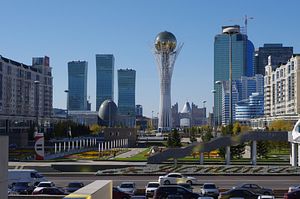KPO, the consortium of companies developing the Karachaganak gas condensate field, agreed to pay the Kazakh government $1.1 billion to resolve a three-year dispute on the profit-sharing arrangement between the shareholders and the government.
The government considered the payment a rectification of an unfair distribution of earnings from hydrocarbon production at Karachaganak, which has been exploited since 1997 by large multinationals under a production sharing agreement (PSA) contract.
“Kazakhstan and the Consortium had differences in the method of calculating the shares of the parties in the section of profitable products,” a press release from the prime minister office read. “However, taking into account the long-term experience of cooperation, the parties in the negotiation process have found a mutually beneficial way to resolve the dispute amicably.”
Ironically, the agreement to exploit Karachaganak was called “Final PSA,” yet since its signing the shareholding has changed substantially. Initially, Eni and BG Group each held 32.5 percent of the shares, while ChevronTexaco (20 percent) and Lukoil (15 percent) owned the rest. In 2009, however, KPO brought the government to the arbitration court in Stockholm, claiming it had unduly paid over $1.3 billion in export duty between 2003 and 2008. The government responded with a counterlawsuit and soon after then-Prime Minister Karim Massimov said the national oil company, Kazmunaigas, was seeking to become a shareholder in the project.
Pressure by the government, which led to the resignation of Kazmunaigas’s chief negotiator Maksat Idenov and large environmental fines, culminated in 2012, when the consortium decided to give Kazmunaigas a 10 percent stake in KPO for $2 billion in cash. Eni and BG’s share decreased to 29.25 percent, Chevron’s to 18 percent and Lukoil’s to 13.5 percent. Since 2012, KPO became exempt from export duties until the expiration of the PSA in 2037.
When Shell bought BG Group in 2016, however, the Kazakh government sought another opportunity to renegotiate the terms of the “final” PSA. The government was not interested in increasing its stake, but rather in a compensation for unfairly distributed profits between the company and the state coffers. In 2016, Energy Minister Kanat Bozumbayev told the Financial Times that the consortium had already recovered the so-called “cost oil,” or the initial investment, and it should have been distributing “profit oil” cash to the state in larger proportions. When KPO offered $300 million to resolve the dispute, the government refused, fueling uncertainty.
With its low extraction cost, Karachaganak has been a profitable project for both foreign companies and the government. In 2017, Eni paid €161 million ($186 million) in taxes for Karachaganak, Shell paid $214 million, Lukoil paid 5.6 billion rubles ($85 million). But the shareholders had been shy in giving a green light to the multibillion dollar investment needed to expand the project, especially because of the dispute with the government.
Immediately after the resolution of the dispute this week, KPO pledged its first $5 billion investment. The government boasted about the agreement as a victory.
“Our three-year-long negotiations with the Consortium were very difficult,” Bozumbayev said. “The lengthy process was due to both the complexity of the terms discussed and our emphasis on maximizing the interests of the state.”
Karachaganak produced around 12.3 million tonnes of oil in 2017, the vast majority of which was exported via the Caspian Pipeline Consortium, which runs around the Caspian Sea to the Black Sea port of Novorossiysk in Russia.
Importantly, by carefully crafting the agreement in favor of the government, the ministry sidelined Kazmunaigas, which had emerged as the main winner of the 2009-2012 negotiations. During the latest talks, the oil price had plunged below $50 per barrel for months and Kazmunaigas had to sell futures and undergo a restructuring that has not yet finished. Rather than continue to prop up its energy giant, Kazakhstan decided to devise a metaphorical pipeline that would pump cash directly from Karachaganak to the state coffers in Astana.













